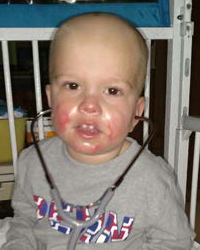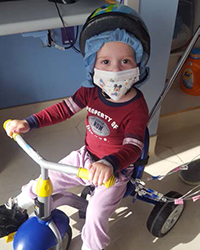 In his short life, Finn has faced more challenges and been hospitalized more times than most people do in a lifetime. From birth, Finn has struggled with developmental delays, countless illnesses, including chronic ear infections, viral rashes, fevers over 106, chicken pox, shingles, etc. After seeing numerous doctors, specialists, and enduring every test there is, Finn’s family finally had an answer. At 7am on Saturday, August 22nd of last year, Finn’s mother received a phone call that no parent should ever have to receive. Her two year old son had a critical illness, which would be fatal, unless he received a bone marrow transplant as soon as possible.
In his short life, Finn has faced more challenges and been hospitalized more times than most people do in a lifetime. From birth, Finn has struggled with developmental delays, countless illnesses, including chronic ear infections, viral rashes, fevers over 106, chicken pox, shingles, etc. After seeing numerous doctors, specialists, and enduring every test there is, Finn’s family finally had an answer. At 7am on Saturday, August 22nd of last year, Finn’s mother received a phone call that no parent should ever have to receive. Her two year old son had a critical illness, which would be fatal, unless he received a bone marrow transplant as soon as possible.
Finn’s diagnosis was a rare metabolic disorder called Purine Nucleoside Phosphoylase (PNP) Deficiency. PNP Deficiency is one several disorders that damage the immune system and cause severe combined immunodeficiency (SCID). Babies with SCID lack almost all immune protection from bacteria, viruses, and fungi. Without treatment, the deficiency is typically fatal by age one. SCID is often referred to as, “the boy in the plastic bubble disease.” The name of a 1970’s movie inspired by David Vetter, a boy with SCID that lived for 12 years in a plastic, germ-free bubble. PNP Deficiency also causes neurological symptoms, such as developmental delay, low muscle tone, muscle stiffness, difficulties with balance and coordination, and much much more. To date, there is no cure or conclusive prognosis for the neurological symptoms caused by PNP Deficiency.
 In preparation of his bone marrow transplant, Finn started intense myeloablative chemotherapy on November 10th of 2015, while staying at of the Children’s Hospital of Philadelphia (CHOP). On November 21st of 2015, Finn had his much needed bone marrow transplant. After 44 long days in the hospital, Finn’s parents got to take him home just in time to celebrate Christmas with his best friend and big sister, Alyse.
In preparation of his bone marrow transplant, Finn started intense myeloablative chemotherapy on November 10th of 2015, while staying at of the Children’s Hospital of Philadelphia (CHOP). On November 21st of 2015, Finn had his much needed bone marrow transplant. After 44 long days in the hospital, Finn’s parents got to take him home just in time to celebrate Christmas with his best friend and big sister, Alyse.
Currently, Finn is still susceptible to any kind of virus, infection, or fungi. A fever for Finn is treated as a medical emergency and results in at least a few day hospital stay. Until his blood counts recover, he must stay at home in isolation. Daily he is fed through an NG tube and takes numerous medications to help prevent him from getting ill. Weekly, he goes to CHOP for blood transfusions, intravenous immunoglobulin, or just routine blood work. Finn’s family remains optimistic that his immune system will make a full recovery. In the meantime, they cherish every day they have with Finn.
